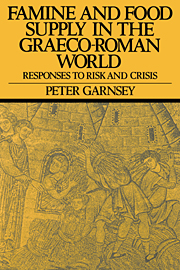Book contents
- Frontmatter
- Contents
- List of tables and figures
- Preface
- Abbreviations
- Maps
- PART I THE INCIDENCE AND SEVERITY OF FOOD CRISIS
- PART II SURVIVAL STRATEGIES
- PART III FOOD SUPPLY AND FOOD CRISIS IN ATHENS C. 600–322 BC
- PART IV FOOD SUPPLY AND FOOD CRISIS IN ROME C. 509 BC – AD 250
- 11 The beginnings of empire
- 12 Rulers of the Mediterranean
- 13 Food and politics
- 14 Rulers of the world
- 15 The subjects of Rome
- CONCLUSION
- Bibliography
- Index
12 - Rulers of the Mediterranean
Published online by Cambridge University Press: 12 November 2009
- Frontmatter
- Contents
- List of tables and figures
- Preface
- Abbreviations
- Maps
- PART I THE INCIDENCE AND SEVERITY OF FOOD CRISIS
- PART II SURVIVAL STRATEGIES
- PART III FOOD SUPPLY AND FOOD CRISIS IN ATHENS C. 600–322 BC
- PART IV FOOD SUPPLY AND FOOD CRISIS IN ROME C. 509 BC – AD 250
- 11 The beginnings of empire
- 12 Rulers of the Mediterranean
- 13 Food and politics
- 14 Rulers of the world
- 15 The subjects of Rome
- CONCLUSION
- Bibliography
- Index
Summary
In 123 BC Gaius Gracchus as tribune of the plebs carried a measure providing for the monthly sale of grain to citizens of Rome at the fixed, low price of 6⅓ asses per modius, and for the construction of state granaries. Regular distributions of grain were a novelty in Rome and, on the scale envisaged in the Gracchan law, quite unparalleled in the earlier history of the Mediterranean world. Their institution presupposes an extraordinary expansion of Rome's power and resources, the development of a comprehensive network of supply, and a dramatic growth of the population of the city of Rome to the point where the vulnerability of its poorer inhabitants to hunger and starvation could become a political issue. This chapter sets out the main developments in the matter of supply and distribution, and assesses the ability of the Roman state to feed a fast-rising city population, in the century that separated the beginning of the Hannibalic War from the tribunate of Gaius Gracchus.
SUPPLY
Overseas suppliers
Cicero in a speech of 66 BC tells how Pompey as Grain Commissioner ‘visited Sicily, explored Africa and sailed to Sardinia … and secured those three sources of our country's food supplies’. In the age of Cicero, Sicily, Africa and Sardinia were all provinces which paid taxes to Rome in kind in the form of grain. The tithe of Sicily brought in around 3 million modii of grain each year, but the Roman government some-times drew as much again, or more, from the province. Africa might have been sending around 8 million modii of grain to Rome as tax in the same period.
- Type
- Chapter
- Information
- Famine and Food Supply in the Graeco-Roman WorldResponses to Risk and Crisis, pp. 182 - 197Publisher: Cambridge University PressPrint publication year: 1988



